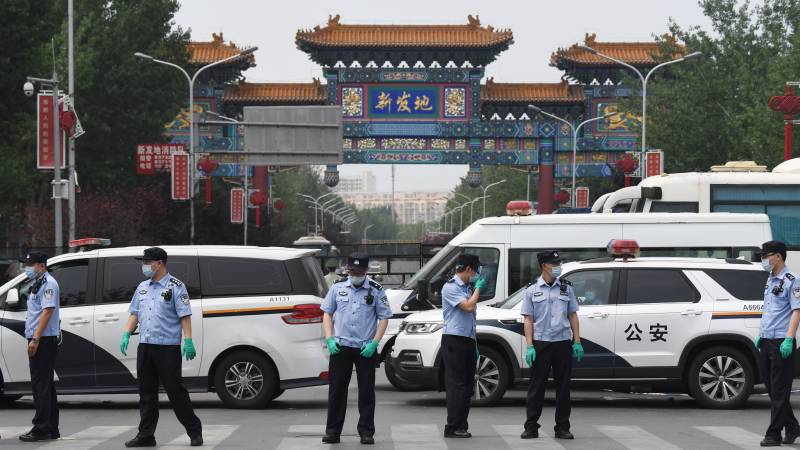Fresh China cluster raises fears for pandemic control

Stay tuned with 24 News HD Android App

Lockdowns were imposed in parts of Beijing on Saturday to try and prevent the spread of a new coronavirus cluster, highlighting the challenges that lie ahead even for places where outbreaks are under control.
It came as Brazil claimed the unenviable position of having the second-highest virus death toll worldwide behind the United States, with no sign the infection rate is slowing in Latin America.
Some of Europe's hardest hit countries meanwhile are further emerging from lockdown, even as fingers are being pointed at who is to blame for the health and economic crisis. The respiratory disease was first detected in central China last year, believed to have jumped from an animal to humans at a market that sold wildlife.
China largely eliminated transmission within its borders through hyper-strict lockdowns that were emulated across the globe. But after mass testing at a wholesale food market in southern Beijing this week detected more than 50 new infections, people were forced indoors at 11 nearby residential estates.
It has fuelled fears of a resurgence in local transmission and marks a painful step backwards in the capital's return to normality. Officials said the district has established a "wartime mechanism" to deal with the outbreak, as paramilitary police were seen around the market and a mass testing campaign was announced.
The chairman of the Xinfadi market told state media that the virus was detected on chopping boards used to handle imported salmon.
More than 426,000 dead
Worldwide, the pandemic has killed more than 426,000 people and infected more than 7.6 million, while wreaking large-scale economic devastation.
Brazil's health ministry recorded 909 deaths in the past 24 hours, putting the total at 41,828 -- meaning the country of 212 million people has now surpassed Britain's death toll.
"Some areas are at a critical stage" in Brazil, with intensive care unit occupancy levels of more than 90 percent, World Health Organization emergencies director Mike Ryan said.
Brazilian President Jair Bolsonaro, who threatened last week to quit the WHO over "ideological bias", has dismissed the virus as a "little flu", and berated state officials for imposing lockdowns.
World health officials have warned that the virus is far from contained.
The WHO this week said the pandemic is accelerating in Africa, and on Saturday Botswana's capital Gaborone locked down after new cases were detected.
In the US, which has confirmed the most COVID-19 deaths with over 114,000, more than a dozen states, including two of the most populous, Texas and Florida, reported their highest-ever daily case totals this week.
But Europe is pushing ahead with its exit from lockdown, with a number of countries preparing to reopen borders on Monday after the EU Commission urged a relaxation of restrictions.
France said it would gradually reopen its borders to non-Schengen countries from next month, and Germany said it would end land border checks on Monday.
Greece said it would welcome tourists again, while Poland on Saturday reopened its borders to all fellow EU members.
Court action
In several European countries the focus has shifted to the courts and who might eventually be pinned with the blame over the pandemic.
In hard-hit Italy, prosecutors grilled Prime Minister Giuseppe Conte for three hours over his government's initial response.
"I explained everything to prosecutors. I am totally calm," Conte said Saturday, adding he did not fear a judicial probe would be opened.
Elsewhere, British Airways, easyJet and Ryanair launched legal action against the British government over a 14-day coronavirus quarantine system introduced this week.
The pandemic has caused unemployment to soar around the world and particularly affected the poor, whose plight Pope Francis highlighted on Saturday.
"In these months when the whole world was overwhelmed by a virus that brought pain and death, distress and bewilderment, how many outstretched hands we could we see!" the pontiff said in a message for the World Day of the Poor.
Sport has been returning to action around the world, mostly to empty stadiums, but more than 20,000 fans turned out in New Zealand's Dunedin to watch a Super Rugby match on Saturday.
Spectator Wendy said she had feared the country would stay locked down longer.
"But I'm happy that we're not," she said. "Nobody's wearing masks, it's good."
